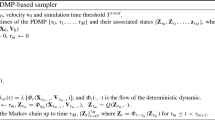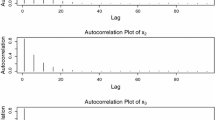Abstract
The random walk Metropolis algorithm is a simple Markov chain Monte Carlo scheme which is frequently used in Bayesian statistical problems. We propose a guided walk Metropolis algorithm which suppresses some of the random walk behavior in the Markov chain. This alternative algorithm is no harder to implement than the random walk Metropolis algorithm, but empirical studies show that it performs better in terms of efficiency and convergence time.
Similar content being viewed by others
Explore related subjects
Discover the latest articles, news and stories from top researchers in related subjects.References
Besag, J., Green, P., Higdon, D. and Mengersen, K. (1995) Bayesian computation and stochastic systems (with discussion). Statistical Science, 10, 3–36.
Diaconis, P., Holmes, S. and Neal, R. M. (1997) Analysis of a non-reversible Markov chain sampler. Technical Report BU-1385-M, Biometrics Unit, Cornell University.
Duane, S., Kennedy, A. D., Pendleton, B. J. and Roweth, D. (1987) Hybrid Monte Carlo. Physics Letters B, 195, 216–222.
Gelfand, A. E. and Smith, A. F. M. (1990) Sampling-based approaches to calculating marginal densities. Journal of the American Statistical Association, 85, 398–409.
Gelman, A., Roberts, G. and Gilks W. (1996) Efficient Metropolis jumping rules, in Bayesian Statistics 5, Berger, J. O., Bernardo, J. M., Dawid, A. P. and Smith, A. F. M. (eds), Oxford University Press.
Geman, S. and Geman, D. (1984) Stochastic relaxation, Gibbs distributions and the Bayesian restoration of images. IEEE transactions on Pattern Analysis and Machine Intelligence, 6, 721–741.
Greenhouse, J. and Wasserman, L. (1996) A practical robust method for Bayesian model selection: a case study in the analysis of clinical trials, in Bayesian Robustness Berger, J. O., Betro, B., Moreno, E., Pericchi, L. R., Ruggeri, F., Salinetti, G. and Wasserman, L. (eds), Institute of Mathematical Statistics Lecture Notes — Monograph Series, pp. 41–58.
Hastings, W. K. (1970) Monte Carlo sampling methods using Markov chains and their applications. Biometrika, 57, 97–109.
Horowitz, A. M. (1991) A generalized guided Monte Carlo algorithm. Physics Letters B, 268, 247–252.
Kass, R. E., Carlin, B. P., Gelman, A. and Neal, R. M. (1998) Markov chain Monte Carlo in practice: a roundtable discussion. The American Statistician, 52, 93–100.
Kuo, L. and Yang, T. Y. (1996) Bayesian computation for non-homogeneous Poisson processes in software reliability. Journal of the American Statistical Association, 91, 763–773.
Metropolis, N., Rosenbluth, A. W., Rosenbluth, M. N., Teller, A. H. and Teller, E. (1953) Equations of state calculations by fast computing machines. Journal of Chemical Physics, 21, 1087–1092.
Muller, P. and Rios Insua, D. (1995) Issues in Bayesian analysis of neural network models. Working Paper 95–31, Institute of Statistics and Decision Sciences, Duke University.
Muller, P. and Roeder, K. (1997) A Bayesian semiparametric model for case-control studies with errors in variables. Biometrika, 84, 523–537.
Neal, R. M. (1993) Probabilistic inference using Markov Chain Monte Carlo methods. Technical Report CRG-TR–93–1, Department of Computer Science, University of Toronto.
Neal, R. M. (1995) Suppressing random walks in Markov Chain Monte Carlo using ordered overrelaxation. Technical Report 9508, Department of Statistics, University of Toronto.
Newton, M. A., Czado, C. and Chappell, R. (1996) Bayesian inference for semiparametric binary regression. Journal of the American Statistical Association, 91, 142–153.
Roberts, G. O., Gelman, A. and Gilks, W. (1997) Weak convergence and optimal scaling of random walk Metropolis algorithms. Annals of Applied Probability, 7, 110–120.
Roberts, G. O. and Rosenthal, J. S. (1998) Optimal scaling of discrete approximations to Langevin diffusions. Journal of the Royal Statistical Society B, to appear.
Sargent, D. J. (1997) A flexible approach to time-varying coefficients in the Cox regression setting. Lifetime Data Analysis, 3, 13–25.
Sargent, D. J. (1998) A general framework for random effects survival analysis in the Cox proportional hazards setting. Biometrics, 54, to appear.
Smith, A. F. M. and Roberts, G. O. (1994) Bayesian computation via the Gibbs sampler and related Markov chain Monte Carlo methods (with discussion). Journal of the Royal Statistical Society B, 55, 3–23.
Tierney, L. (1994) Markov chains for exploring posterior distributions (with discussion). Annals of Statistics, 22, 1701–1762.
Verdinelli and Wasserman (1998) Bayesian goodness of fit testing using infinite dimensional exponential families. Annals of Statistics, 26, 1215–1241.
Waller, L. A., Carlin, B. P., Xia, H. and Gelfand, A. E. (1997) Hierarchical spatio-temporal mapping of disease rates. Journal of the American Statistical Association, 92, 607–617.
Author information
Authors and Affiliations
Rights and permissions
About this article
Cite this article
GUSTAFSON, P. A guided walk Metropolis algorithm. Statistics and Computing 8, 357–364 (1998). https://doi.org/10.1023/A:1008880707168
Issue Date:
DOI: https://doi.org/10.1023/A:1008880707168




